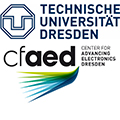
|
|
|
 |
|
The Phantoms Foundation based in Madrid, Spain, focuses its activities on Nanoscience and Nanotechnology (N&N) and is now a key actor in structuring and fostering European Excellence and enhancing collaborations in these fields. The Phantoms Foundation, a non-profit organisation, gives high level management profile to National and European scientific projects (Involved in 11 European projects in the last 10 years either as coordinator or partner) and provides an innovative platform for dissemination, transfer and transformation of basic nanoscience knowledge, strengthening interdisciplinary research in nanoscience and nanotechnology and catalysing collaboration among international research groups.
The Foundation also works in close collaboration with Spanish and European Governmental Institutions to provide focused reports and catalogues on N&N related research areas:
- Coordinator/Editor of the Catalogue of Nanoscience & Nanotechnology Companies in Spain (published for the 6th time), which provides a general overview of the Nanoscience and Nanotechnology companies in Spain and in particular the importance of this market research, etc.
- The most recent document is the Catalogue of Graphene companies worldwide, which provides a general overview of the Graphene industry worldwide in this emerging field and in particular the importance of this market research, etc. Editions: 2014, 2015 and 2016.
Currently, one of the main core activities is to organize International conferences, meetings and workshops in particular in the “Graphene and 2D Materials” area:
|
|
|
|
|
 |
|
The University of Strasbourg was founded in the 16th century by Johannes Sturm, a protestant scholar. Sturm created a Protestant Gymnasium in 1538 with the mandate of disseminating knowledge, one of the core values of Humanism. Through the years, the Gymnasium progressively developed into an Academy and a University before it finally became the Royal University in 1631.
In 1870, Alsace and the Moselle department of Lorraine were annexed by the German Empire after the Franco-Prussian War. Strasbourg, capital city of the Reichsland (the Imperial Territory of Alsace-Lorraine), experienced rapid growth and prosperity that lasted until the First World War. The University - which had become the Kaiser-Wilhelms-Universität - benefited from this development though the creation of libraries and institutes, the collaboration with eminent scholars and the diversification of academic disciplines. The traditions of research and openness to the world inherited from this period are still at the heart of the University’s values today.
Today, Strasbourg is the second most international university city in France (after Paris). The University of Strasbourg counts 42000 students, offers initial and further education in a wide range of academic fields and is an international player in scientific research.
|
|
|
|
|
 |
|
The Cluster of Excellence ‘Center for Advancing Electronics Dresden’ (cfaed) of Technische Universität Dresden comprises eleven research institutes in Saxony. Further members are the Technische Universität Chemnitz, two Max Planck Institutes, two Fraunhofer Institutes, two Leibniz Institutes and the Helmholtz-Research Center Dresden-Rossendorf. About 300 scientists are working in nine research paths to investigate completely new technologies for electronic information processing. These technologies are inspired by innovative materials such as silicon nanowires, carbon nanotubes or polymers or based on completely new conceptions such as circuit fabrication methods by self-assembling structures, e.g. DNA-Origami. The orchestration of these new devices into heterogeneous information processing systems with focus on their resilience and energy-efficiency is also part of cfaed’s research program. To complement the Cluster, the Collaborative Research Center (CRC) 912 ‘Highly Adaptive Energy-Efficient Computing’ (HAEC) has been integrated in cfaed. Both, cfaed and HAEC, are coordinated by Prof. Dr.-Ing. Dr. h.c. Gerhard Fettweis, who holds the Vodafone Chair Mobile Communications Systems at TU Dresden.
Website: www.cfaed.tu-dresden.de |
|
|
|
|
 |
|
The National Research Council (Cnr) is the largest public research institution in Italy, the only one under the Research Ministry performing multidisciplinary activities.
Founded as legal person on 18 November 1923, Cnr’s mission is to perform research in its own Institutes, to promote innovation and competitiveness of the national industrial system, to promote the internationalization of the national research system, to provide technologies and solutions to emerging public and private needs, to advice Government and other public bodies, and to contribute to the qualification of human resources.
In the Cnr's research world, the main resource is the available knowledge which means people, with their skills, commitment and ideas. This capital comprises more than 8.000 employees, of whom more than half are researchers and technologists. Some 4.000 young researchers are engaged in postgraduate studies and research training at Cnr within the organization’s top-priority areas of interest. A significant contribution also comes from research associates: researchers, from Universities or private firms, who take part in Cnr’s research activities.
Website: www.cnr.it/en |
|
|
|
|
|


